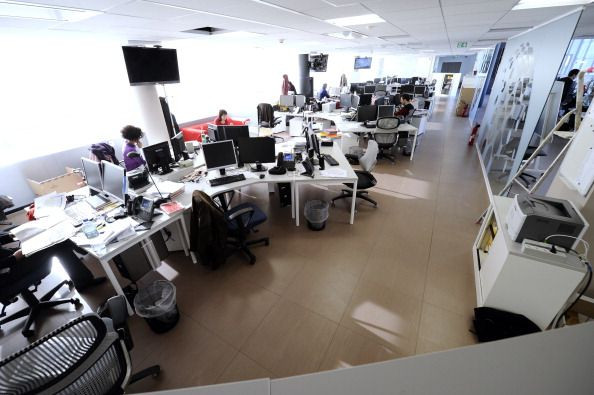What Is WeWork? Company Gets $3 Billion In Funding From Softbank

Business productivity appears to be changing with help from WeWork. In what some might view as a bold and innovative approach to an evolving corporate landscape, the global co-sharing company has sought to flip mundane office space culture for a creative work area that employers and employees may actually look forward to going to each day.
With playful colors, bright light spaces, and plenty of snacks and refreshments to go around, the WeWork model could be changing the way companies do business. "Space as a service" is a philosophy that appears to be resonating with customers, as the company anticipates a doubling of membership to 400,000 people by the end of 2018.
The New York-based company, which was founded in 2010, has a model that uses a team of engineers, artists, and designers to create co-sharing office spaces that fits the changing corporate culture. Gone are the boring filing cabinets and desks, as WeWork instead looks to integrate co-sharing workspaces that spark creativity and performance for owners of business startups and small businesses as well as freelancers, remote employees and entrepreneurs.
The idea of co-shared office spaces is becoming a real asset for professionals that are looking to get out of their home office and into the work world. With shared office spaces around the globe, WeWork allows business professionals a space to work without the additional overhead of a full brick-and-mortar location.
Co-sharing members have access to an array of amenities including coffee, office supplies, daily cleaning, printers, mail services, internet, and more – all within the decked out creative space the company has designed just for them.
With hopes of expanding its community-like appeal, WeWork offers professionals the ability to take part in a series of social networking events, workshops and even a summer retreat. Members also have access to health insurance – a real commodity for new business owners and contract workers.
WeWork has locations in 83 cities in 24 countries and the company has higher growth potential due to a recent increase in investment.
On Tuesday, WeWork announced an extra $3 billion in financing from Japanese conglomerate SoftBank Group Corp. The deal has lifted WeWork's value to either $42 billion or $45 billion and could make it the second-most valued startup behind Uber Technologies, according to the Wall Street Journal.
The recent investment should probably not come as a big surprise. SoftBank in August 2017 invested about $4.4 billion in WeWork, which boosted the company's value to $20 billion, and in June a SoftBank executive said WeWork was raising money at a $35 billion valuation.
CNN Money reported that the company has 50 percent of its co-sharing desks located outside the U.S. and is at 84 percent occupancy.
© Copyright IBTimes 2025. All rights reserved.





















